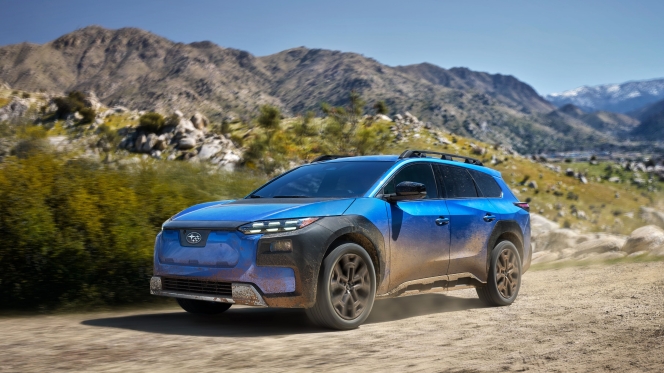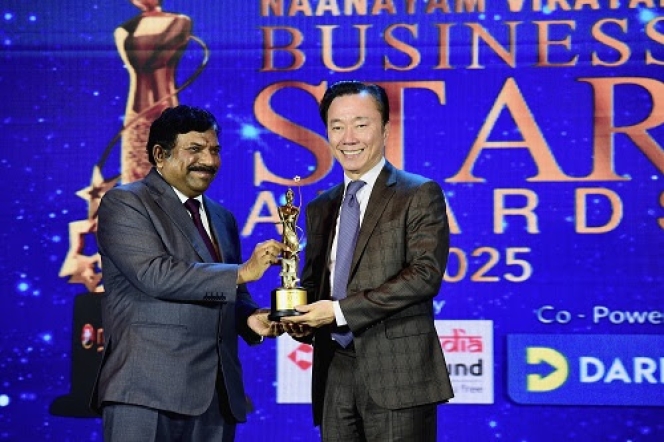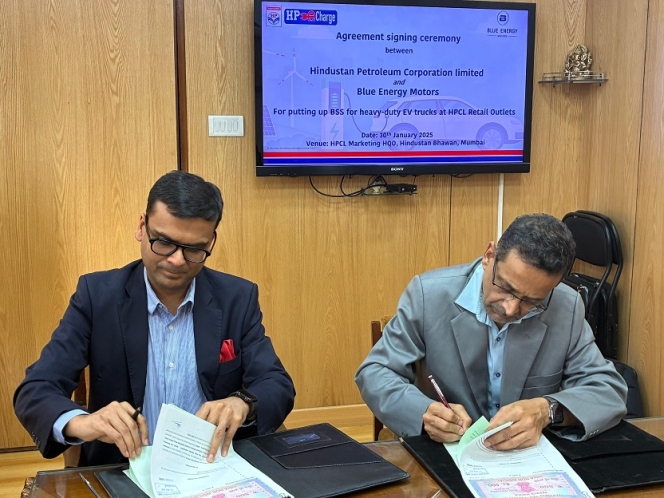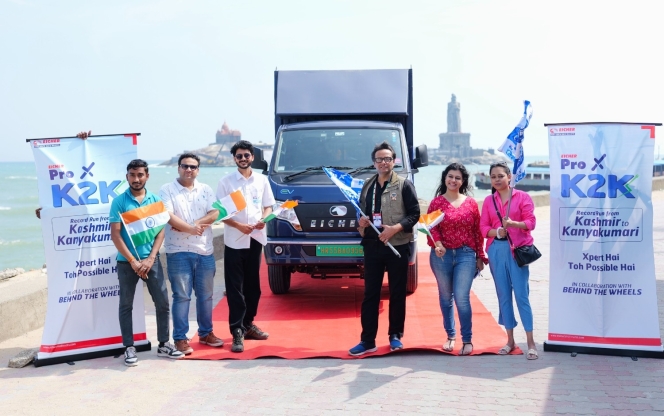
Toyota made a splash in India recently by showcasing a flex-fuel hybrid vehicle. This amounted to a logical step in its efforts to highlight its work in the area of alternative fuel technologies soon after it supplied the Union Transport Minister, Nitin Gadkari, with a hydrogen fuel cell car. The year 2022 has been a year of much action and words in the area of alternative fuels in India. The Brazilian Ambassador to India, d. Andre Aranha Correa Do Lago, said in his speech at the recent SIAM Annual Convention that Brazil and India are the two largest sugarcane producers and have the potential to produce enormous amounts of ethanol. “Brazil will work with India on flex-fuel technology, sustainable aviation fuels, second generation ethanol, hybrid flex-fuel vehicles, fuel cells etc.,” he averred.
At the same event, Gadkari mentioned that through innovation, science, research, technology and entrepreneurship, the auto industry should convert knowledge to fuel and devise alternative fuel technologies. Stating that the petroleum product import is amounting to INR 16 trillion and is a challenge for the country, he averred, “I am happy to see good growth of electric vehicles across segments. Around 1.5 million EVs have been registered and the overall sales figure is up by 162 percent. The sales growth of electric two-wheelers is 425 percent, electric three-wheelers is 75 percent, electric four-wheelers is 230 percent and electric buses is 1,600 percent. The number of new start-ups in the domain is 250.” In October 2022, Chinese electric automaker BYD announced the launch of its second electric vehicle in India in the form of an electric SUV called the Atto 3. It will commence sales starting January 2023.
As electric vehicles continue to gain strength across segments, it is the two-wheeler segment that seems to gain in sales numbers the most. No surprise then that Taiwanese electric two-wheeler major Gogoro is expected to launch electric scooters in India soon. The company has been having a tie-up with Hero MotoCorp in India for some time now and the two are said to be working on developing a battery swapping technology that is suitable for the local and regional requirements. Hero MotoCorp and Gogoro are not the only ones; there are other companies too – like Sun Mobility – that are already working on battery swapping technology.
With the need for smart grids and a battery charging infrastructure growing as part of the thrust towards alternative fuel technologies to achieve net-zero carbon emissions, the question being asked is: which alternative fuel technology will finally triumph with efforts being made in various areas and directions? A portion of the auto industry is betting on hydrogen as the ultimate alternative fuel. Another portion of the industry is betting on flex-fuel and other alternative fuel technologies, including various gases like LNG and CNG.
With countries like Russia banking on gaseous fuel as a means to reduce carbon emissions since they are available in abundance there, it is countries like India, which imports 85 percent of the fuels, that needs to find out what it has in abundance and select as the alternative fuel of choice, mentioned an industry expert from Europe. He added that a unique alternative fuel technology from India could actually lead to a global breakthrough and help mobility advance in a new direction altogether. With the possibility of such a disruption always present, the current situation is looking a bit unorganised with a variety of alternative fuels being taken into consideration.
On one hand, CNG stations are being increased and commercial vehicle operators are taking to it, while on the two-wheeler level, it is the electric vehicle technology that is gathering pace. The most diverse are the efforts at the passenger car level, where Maruti Suzuki and Toyota seem to look at hybrid and flex-fuel, whereas the ones like BYD, MG and Tata Motors are looking at electric to go net-zero carbon. The investment in BS VI technology, which promised water at the tailpipe through emissions cleaner than the air, is yet to fructify for some or many automakers and the call for rapid development in alternative fuel technologies is being summoned.
With sustainability being the mantra as the auto industry in India sees good days after a prolonged slowdown, the high inflation and resulting steep increase in vehicle prices is already threatening to spoil the party. A point of worry being that if the work on alternative fuel technologies is affected as inflation is likely to bite harder in 2023, the need to keep global temperatures from rising above the 1.5-degree Celsius mark stays. The auto industry is expected to contribute the most and also ensure sustainable, affordable and desirable mobility at the same time. A tightrope walk beckons as the mantle of alternative fuel technologies can’t be abandoned.
One thing is clear that what holds for India is what India has in abundance. Like Russia has gas, India could do well in developing technologies that can create gas from waste and other means available locally in abundance. Rather than politicising city waste that is often dumped just outside the city, it will serve if it could be turned into fuel to power automobiles as well as industrial furnaces and other machines. Afterall, despite all the efforts in electrification and other alternative fuel technologies, roughly 95 percent of the vehicles that continue to sell the world over are still powered by IC engines!
Subaru Begins Production Of BEVs At Upgraded Gunma Yajima Plant
- By MT Bureau
- February 04, 2026

Marking a significant step in its electrification strategy, Subaru Corporation has initiated domestic production of Battery Electric Vehicles at its Gunma Yajima Plant. This launch coincides with the finalisation of extensive upgrades to the plant’s production systems, a project commenced in August 2025. Central to these enhancements is a new, flexible assembly line engineered to manufacture the all-new E-Outback alongside traditional petrol and hybrid models within a single, integrated process. This approach leverages Subaru's established expertise in mixed-model production, allowing the company to adapt efficiently to the evolving automotive landscape.
The E-Outback itself represents a key milestone as Subaru's second global BEV, developed through a longstanding alliance with Toyota Motor Corporation. This partnership, celebrating its twentieth anniversary in 2025, has grown to encompass collaborative efforts in development, production and supply chain management. The recent manufacturing advancements are a direct result of deepened cooperation in electrification technologies, combined with continuous refinement of Subaru’s own manufacturing, or monozukuri, capabilities.
Looking forward, Subaru intends to further increase manufacturing flexibility. This focus aims to achieve greater production efficiency and development agility, thereby strengthening the company's ability to respond to market shifts and bolster its overall competitiveness. The Subaru E-Outback is scheduled for introduction in the United Kingdom during Summer 2026, with full specifications to be disclosed nearer the launch date.
- VinFast
- Investor of the Year
- Urban Electric Vehicle of the Year
- VinFast VF 7
- Motor Vikatan Awards 2026
VinFast Wins Dual Honours In India For Investment And Electric SUV
- By MT Bureau
- January 31, 2026

VinFast’s strategic progress in India has been further validated through recent accolades from the influential Vikatan Group media network. The company was distinguished with two significant awards: one recognising its substantial investment commitment, and the other honouring its VF 7 model as the premier urban electric vehicle for 2026. These commendations underscore the brand’s deepening integration into the Indian automotive sector, highlighting both its industrial strategy and its product relevance.
The title of Investor of the Year, conferred by Nanayam Vikatan business magazine, specifically acknowledges VinFast’s landmark commitment to establishing an electric vehicle manufacturing facility in Thoothukudi, Tamil Nadu. This project is noted not only for its scale and strategic clarity but also for its anticipated role in fostering a new industrial corridor, generating employment and bolstering the local supplier network. It aligns with national initiatives like Make in India and reflects confidence in the region’s manufacturing potential.
Concurrently, the VF 7 electric SUV was named Urban Electric Vehicle of the Year at the Motor Vikatan Awards 2026. This recognition from automotive experts underscores the model’s successful adaptation to India’s urban driving conditions, balancing design, performance, safety and comfort. It serves as a testament to VinFast’s product development focus and its localisation strategy aimed at meeting specific market demands.
As a respected media institution in South India with a legacy dating to 1926, the Vikatan Group’s awards carry considerable weight among businesses and consumers. These latest honours add to a growing list of VinFast’s achievements in the market, illustrating the convergence of its investment, manufacturing, and product efforts. Within a short timeframe, the company has employed a long-term strategy encompassing manufacturing, retail, charging infrastructure and after-sales services. Through this comprehensive approach and a focus on sustainable innovation, VinFast is steadily building its brand presence while contributing to India’s transition towards green mobility.
Pham Sanh Chau, CEO, VinFast Asia, said, “Being recognised in two important award categories demonstrates how VinFast is steadily building its position in India, not only through long term investment commitments but also through products developed to match local conditions and user needs. This recognition provides further momentum for us to accelerate implementation, expand the electric vehicle ecosystem, and maintain a long-term partnership with the Indian market.”
B Srinivasan, CEO, Vikatan Group, said, “VinFast India represents the new-age investor – bold in vision, swift in execution and deeply aligned with India’s growth story. By unravelling the true potential of the port city of Thoothukudi, VinFast India has helped create a conducive industrial ecosystem, played a positive role in employment generation and restored the city’s importance on India’s manufacturing map. Their investment is not just capital at work but confidence in India’s future.”
Blue Energy Motors And HPCL Forge Nationwide Pact For Electric Truck Battery Swapping
- By MT Bureau
- January 30, 2026

Blue Energy Motors and Hindustan Petroleum Corporation Limited (HPCL) have entered a strategic partnership to deploy Battery Swapping Stations for electric commercial trucks at select HPCL fuel outlets nationwide. This initiative leverages HPCL’s extensive network of over 24,400 retail locations to create a widespread and convenient energy infrastructure for freight operators. By situating swap stations within established fuelling hubs, the collaboration seeks to make electric mobility a practical and scalable reality for India’s logistics sector.
The core advantage of battery swapping lies in its dramatic reduction of energy replenishment time to under five minutes, minimising vehicle downtime compared to conventional charging. For fleet operators, this efficiency translates into higher vehicle utilisation, improved productivity and more predictable scheduling. Furthermore, a growing and accessible network of swap stations alleviates range anxiety, enabling electric heavy-duty trucks to confidently undertake longer routes and multiple shifts.
As India advances its green transportation goals, this alliance holds significant strategic value. HPCL’s vast retail footprint, which already supports over 5,400 EV charging points under its HP e-Charge brand, offers a ready platform for rapid infrastructure deployment across key freight corridors. Blue Energy Motors, a pioneer in zero-emission freight solutions, brings its expertise in electric commercial vehicles, exemplified by its launch of India’s first electric freight corridor. Together, the companies aim to accelerate electric vehicle adoption by directly addressing the operational needs of commercial fleets, thereby strengthening the long-term development of sustainable freight transport in the country.
- Eicher Trucks and Buses
- VE Commercial Vehicles
- VECV
- India Book of Records
- IBR
- Eicher Pro X
- Vinod Aggarwal
- SS Gill
- Abhishek Chaudhary
Eicher Pro X EV Completes Kashmir To Kanyakumari Journey In 6 Days
- By MT Bureau
- January 28, 2026

Eicher Trucks and Buses, part of VE Commercial Vehicles (VECV), has completed a journey from Kashmir to Kanyakumari using its Eicher Pro X EV.
The record verified by the India Book of Records (IBR), saw the electric vehicle cover over 4,000 kilometres in 6 days under loaded conditions. The run commenced in Srinagar on 20 January 2026 and concluded in Kanyakumari on 26 January 2026, traversing the Himalayas, plains and the Deccan Plateau.
Throughout the expedition, the vehicle utilised public chargers located via the MyEicher App. An adjudicator from the India Book of Records accompanied the truck to monitor route compliance, load, distance and charging stops. The mission served as a demonstration of electric vehicle endurance across diverse altitudes and climates to validate the technology for logistics corridors.
The journey was intended to show that electric commercial vehicles can operate beyond short-haul deliveries. By maintaining performance across hilly and coastal routes, the Pro X EV aimed to establish total cost of ownership (TCO) benefits and maintenance predictability for fleet operators. The successful completion of the route suggests that current charging infrastructure can support long-haul electric freight movement.
Vinod Aggarwal, MD & CEO, VE Commercial Vehicles, said, “For more than four decades, Eicher trucks and Buses have earned customer trust through leadership in fuel efficiency and application-specific engineering. The record-setting performance of the Eicher Pro X reinforces our unwavering focus on application excellence, reliability, and performance, anchored in robust product development and manufacturing capabilities, and enabled by a customer-centric, pan-India commercial and dealer network. I commend the entire Eicher team for achieving these well-deserved records”.
SS Gill, Chief Commercial Officer, VE Commercial Vehicles, said, “By covering the K2K route with a loaded Pro X EV, Eicher Trucks & Buses has proven that electric mobility is no longer restricted to short-haul, ‘last-mile’ deliveries. We are not just setting records, but through the strength of our service network and extensive dealer set-up, we are demonstrating that our EV technology is commercially viable, reliable, and has the range to serve as the backbone of India’s green logistics corridors”.
Abhishek Chaudhary, SVP – SCV Sales & Marketing, VE Commercial Vehicles, said, “The Eicher Pro X EV was put to the ultimate test – covering over 4000 kilometres across diverse climates and challenging altitudes. With this recognition from the India Book of Records we’ve moved beyond our own stringent testing benchmarks to real-world validation - Demonstrating that Eicher Pro X EV is a dependable partner for logistics movement across varied operations in India”.








Comments (0)
ADD COMMENT